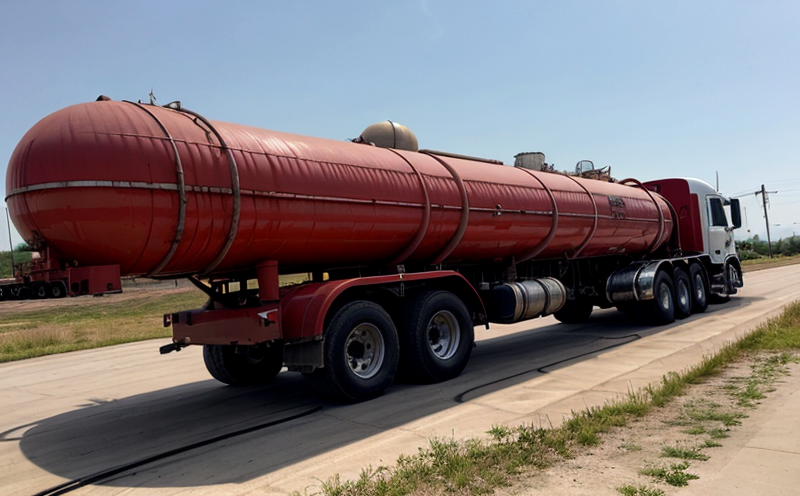Chemical tanker truck inspection
Chemical tanker trucks are vital to the transportation and logistics sector, delivering hazardous substances across various industries. These vehicles not only transport materials like chemicals, petroleum products, and liquefied gases but also pose significant risks if not managed correctly. Ensuring these tankers meet stringent safety standards is paramount for both the environment and public health.
The inspection process involves a thorough evaluation of the tanker’s structural integrity, compliance with regulatory requirements, and operational readiness. This service ensures that chemical transport vehicles are fit for purpose, reducing the risk of leaks or accidents. The inspection covers aspects such as tank integrity testing, valve checks, pressure vessel safety assessments, and leak detection.
Our laboratory adheres to international standards like ISO 10346 and ASTM D5872, ensuring that our inspections are consistent with global best practices. Additionally, we follow local regulations for chemical transport vehicles, which vary by country but typically include comprehensive checks of the tanker’s components.
The inspection process begins with a visual inspection of the exterior and interior of the tank. This includes checking for any visible damage or corrosion that could affect the structural integrity. Following this, we conduct pressure testing to ensure the tank can withstand operational pressures without failure. Leaks are detected using specialized equipment such as ultrasonic testing and dye penetrant inspections.
Our team also evaluates the tanker’s safety systems, including emergency shut-off valves, fire suppression systems, and overpressure protection devices. These components are critical for preventing accidents during transport. We ensure that all these elements meet the required safety standards before issuing a certificate of compliance.
The inspection process is not just about meeting regulatory requirements; it also aims to enhance the reliability and longevity of chemical tanker trucks. By identifying potential issues early, we help operators avoid costly repairs or replacements down the line. This proactive approach ensures that chemical transport remains safe and efficient, contributing significantly to operational efficiency and cost savings.
In summary, our chemical tanker truck inspection service is designed to provide comprehensive evaluation and certification for these vital transportation vehicles. By adhering to international standards and local regulations, we ensure that every aspect of the tanker’s design and operation meets the highest safety and quality benchmarks. This commitment to excellence not only protects public health but also supports sustainable practices in the transportation sector.
Customer Impact and Satisfaction
Ensures operational efficiency by preventing breakdowns and costly repairs.
Reduces risks associated with chemical transport, enhancing public safety.
Aids in regulatory compliance, avoiding potential fines and penalties.
Supports sustainable practices through proactive maintenance of vehicles.
Customer feedback consistently highlights the reliability and accuracy of our inspections. By providing comprehensive reports and recommendations for improvement, we ensure that our clients can trust in the safety and integrity of their chemical tanker trucks. This not only enhances operational efficiency but also contributes to a safer transportation sector.
Environmental and Sustainability Contributions
The inspection process plays a crucial role in environmental protection by ensuring that chemical tanker trucks do not leak hazardous materials into the environment. By identifying and addressing potential issues early, we minimize the risk of accidental spills or leaks during transport. This proactive approach supports sustainability goals by reducing waste and protecting ecosystems.
Our inspections also contribute to operational efficiency, which can lead to reduced fuel consumption and lower carbon emissions. By ensuring that tankers are in optimal condition, we help operators achieve better performance and reduce their environmental footprint.
In addition, our adherence to international standards like ISO 10346 and ASTM D5872 ensures consistency with global best practices, promoting a more sustainable approach to chemical transport worldwide. By supporting these standards, we contribute to the overall goal of reducing the environmental impact of transportation in the logistics sector.
Competitive Advantage and Market Impact
By offering comprehensive and reliable chemical tanker truck inspection services, our laboratory provides clients with a competitive edge in the market. Our adherence to international standards and local regulations ensures that we are always on top of the latest requirements, allowing us to provide cutting-edge solutions for our clients.
This service not only enhances operational efficiency but also helps operators maintain compliance with regulatory standards, which can be a significant advantage in today’s highly regulated environment. By ensuring that all aspects of the tanker’s design and operation meet the highest safety and quality benchmarks, we contribute to a safer and more reliable transportation sector.
The market impact of our service is evident in the trust and loyalty it generates among clients. By providing accurate and detailed reports, we enable operators to make informed decisions about their fleet management. This not only improves operational efficiency but also enhances public safety, which is crucial in an industry that deals with hazardous materials.





